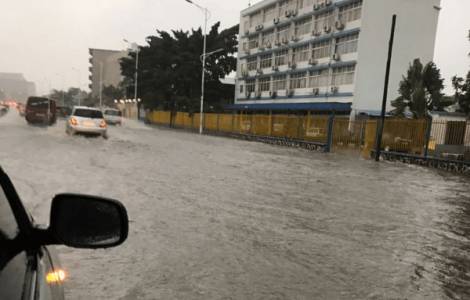
Kinshasa (Agenzia Fides) - Misfortune never comes alone. After the violent repression of the peaceful march of Catholics on December 31, 2017, which resulted in at least seven dead and several injured, Kinshasa began the year with heavy rains that caused deadly floods. The rain that hit the capital of the Democratic Republic of the Congo, on the night between 3 and 4 January and on Sunday 7, caused at least 45 deaths and the destruction of about 200 houses. As a result, thousands are displaced.
"The first responsible, in my opinion, is climate change ... The national authorities are not entirely innocent, especially those who tolerated illegal occupations of non-building spaces, including the population that, sometimes without authorization, builds in complete anarchy", said Lambert Mende, Minister of Communication and Media, and government spokesman, who held two days of national mourning on January 8 and 9.
The third most populous city in Africa after Cairo and Lagos, with over 15 million inhabitants, Kinshasa is the largest French speaking city in the world and one of the most populous in the world. Yet its future appears uncertain.
Fr. Arthur Ponde, diocesan director of Caritas Kinshasa, explains that "the soil of Kinshasa is sometimes swampy, sometimes sandy, a scientific study shows that when hills with 10% slopes are devastated by abusive constructions, erosion is accelerated. The city is seriously threatened by the expansion of 600 erosion points, of which 82 are around the University of Kinshasa".
The parishes of Saint Jean-Marie Muzeyi in the municipality of Lingwala and San Massimiliano Kolbe in the municipality of Selembao were affected. "Rainwater has reached 30 cm in height, flooding the parish and the parish church. It took three days to evacuate the water that caused much damage", says Fr. Apollinaire Makaba, parish priest of Saint Jean-Marie Muzeyi.
Faced with misfortune, the Catholic Church has not remained unresponsive. The department for emergencies and social protection of Caritas carried out a survey of the various parishes. In collaboration with state services, the volunteers of the Caritas community have identified the families affected. Considering the primary needs, including food, clothing, seeds, kitchen sets, mattresses, etc., Caritas Kinshasa estimates the rescue budget is over $867,000. (M.P.B.) (L.M.) (Agenzia Fides, 11/1/2018)